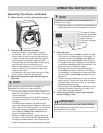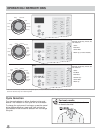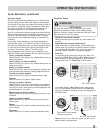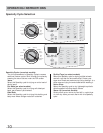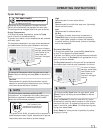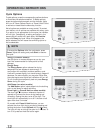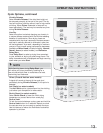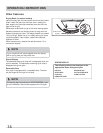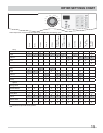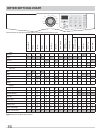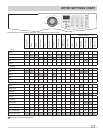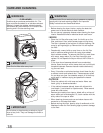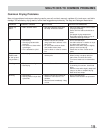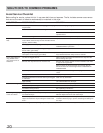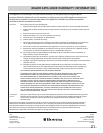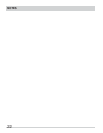
20
SOLUTIONS TO COMMON PROBLEMS
Avoid Service Checklist
Before calling for service, review this list. It may save both time and expense. The list includes common occurrences
that are not the result of defective workmanship or materials in this dryer.
OCCURRENCE POSSIBLE CAUSE SOLUTION
Dryer does not start. Electrical power cord is not securely plugged in or plug
may be loose.
Make sure the plug fi ts tightly in wall outlet.
House fuse blown or circuit breaker tripped. Reset circuit breaker or replace fuse.
Make sure electrical line is not overloaded and the dryer is on a
separate circuit.
Thermal limiter tripped. Call authorized service person for replacement.
Dryer runs but won’t
heat.
There are 2 house fuses in the dryer circuit. If 1 of the 2
fuses is blown, the drum may turn but the heater will not
operate. (electric models)
Replace fuse.
Gas supply valve is not open (gas models). Check to make sure supply valve is open. See INSTALLATION
INSTRUCTIONS for procedure.
Dryer does not have enough air supply to support the
burner fl ame (gas models).
See INSTALLATION INSTRUCTIONS.
LP gas supply tank is empty or there has been a utility
interruption of natural gas (gas models).
Refi ll or replace tank.
Dryer should heat when utility service is restored.
Drying cycle takes too
long, outside of the
dryer feels too hot or
smells hot.
Lint fi lter is clogged with lint. Make sure all lint has been removed from the dryer lint fi lter
before starting each cycle.
Exhaust duct requirements have not been met. Exhaust duct must be at least 4 inches in diameter and made
of rigid or semi-rigid metal.
When in place, the duct must have no more than two 90°
bends and must not exceed length listed in INSTALLATION
INSTRUCTIONS.
Electric dryer is connected to a 208 volt circuit. Drying time will be 20% longer than drying on a 240 volt
circuit.
Drying procedures have not been followed. See “Operating Instructions.”
Outside exhaust hood or exhaust duct may be clogged
or restricted.
Clean out any obstruction.
High humidity. Use a dehumidifi er near the dryer.
Excessive wrinkling. Dryer is overloaded. Do not overload. See “Operating Instructions.”
Items left in dryer too long. Remove items as soon as cycle ends.
Insuffi cient sorting of items. See “Operating Instructions.”
Drying temperature too high. Follow fabric care label instructions.
Scratching or chipping
of the drum fi nish.
Foreign objects such as coins, pins, clips or buttons
are inside the dryer.*
Always remove foreign objects from pockets before laundering.
Remove objects from drum and restart dryer.
Permanently attached items such as belt buckles,
zippers and fasteners may be hitting the inside of the
drum.*
It may be necessary to sew a scrap of material securely around
ornaments before drying to prevent scratching and damage to
the dryer.
*Drum damage caused by foreign objects or permanently attached items is not covered by the warranty.



